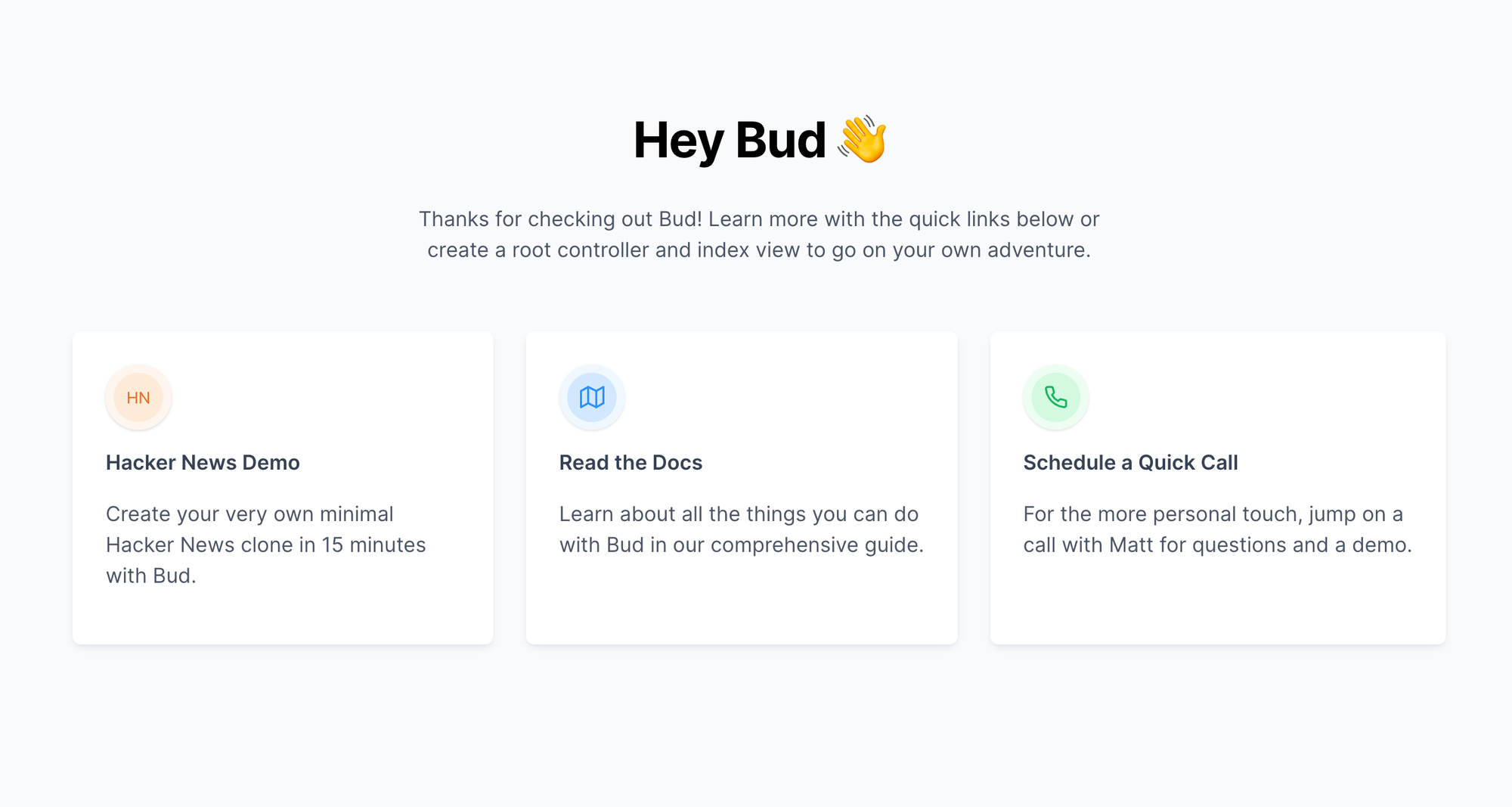Bud
The Full-Stack Web Framework for Go. Bud writes the boring code for you, helping you launch your website faster.
Video Demo
Watch a video demonstrating how to build a minimal HN clone in 15 minutes with Bud.
Documentation
Read the documentation to learn how to get started with Bud.
Installing Bud
Bud ships as a single binary that runs on Linux and Mac. You can follow along for Windows support in this issue.
The easiest way to get started is by copying and pasting the command below in your terminal:
$ curl -sf https://raw.githubusercontent.com/livebud/bud/main/install.sh | sh
This script will download the right binary for your operating system and move the binary to the right location in your $PATH.
Confirm that you've installed Bud by typing bud in your terminal.
bud -h
You should see the following:
Usage:
bud [flags] [command]
Flags:
-C, --chdir Change the working directory
Commands:
build build the production server
create create a new project
run run the development server
tool extra tools
version Show package versions
Requirements
The following software is required to use Bud.
-
Node v14+
This is a temporary requirement that we plan to remove in v0.3
-
Go v1.16+
Bud relies heavily on
io/fsand will take advantage of generics in the future, so while Go v1.16 will work, we suggest running Go v1.18+ if you can.
Your First Project
With bud installed, you can now scaffold a new project:
$ bud create hello
$ cd hello
The create command will scaffold everything you need to get started with bud.
$ ls
go.mod node_modules/ package-lock.json package.json
... which is not very much by the way! Unlike most other fullstack frameworks, Bud starts out very minimal. As you add dependencies, Bud will generate all the boring code to glue your app together. Let's see this in action.
Start the development server with bud run:
$ bud run
| Listening on http://127.0.0.1:3000
Click on the link to open the browser. You'll be greeted with bud's welcome page.
Congrats! You're running your first web server with Bud. The welcome server is your jumping off point to learn more about the framework.
Next Steps
Check out the Hacker News demo, read the documentation, schedule a quick call or go on your own adventure. The only limit is your imagination.
Recent discussions: Reddit, Hacker News, Twitter
How did Bud come into existence?
I started working on Bud 2 years ago after seeing how productive people could be in Laravel. I wanted the same for Go, so I decided to try creating Laravel for the Go ecosystem. However, my first version after 6 months needed to scaffold many files just to get started. If you are coming from Rails or Laravel, you may shrug and consider this as pretty normal.
Unfortunately, I have been spoiled by the renaissance in frontend frameworks like Next.js that start barebones but every file you add incrementally enhances your web application. This keeps the initial complexity under control.
With this additional inspiration, I worked on the next iteration for the ensuing 18 months.
The goals are now:
-
Generate files only as you need them. Keep these generated files away from your application code and give developers the choice to keep them out of source control. You shouldn't need to care about the generated code. You may be surprised to learn that Go also generates code to turn your Go code into an executable, but it works so well you don't need to think about it. Bud should feel like this.
-
Feel like using a modern JS framework. This means it should work with multiple modern frontend frameworks like Svelte and React, support live reload, and have server-side rendering for better performance and SEO.
-
The framework should be extensible from Day 1. Bud is too ambitious for one person. We're going to need an ambitious community behind this framework. Extensibility should be primarily driven by adding code, rather than by adding configuration.
-
Bud should provide high-level, type-safe APIs for developers while generating performant, low-level Go code under the covers.
-
Bud should compile to a single binary that contains your entire web app and can be copied to a server that doesn't even have Go installed.
Contributing
Please refer to the Contributing Guide to learn how to run and test Bud locally.











